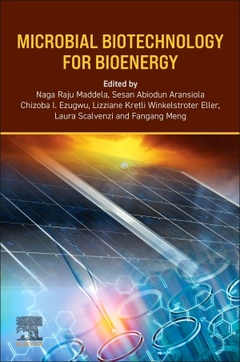Microbial Biotechnology for Bioenergy
Coordonnateurs : Maddela Naga Raju, Aransiola Sesan Abiodun, Ezugwu Chizoba I., Winkelstroter Eller Lizziane Kretli, Scalvenzi Laura, Meng Fangang

Microbial Biotechnology for Bioenergy presents emerging biotechnological and microbiological approaches in bioenergy and their economic, social, and environmental implications. Section 1 of this book includes an overview of bioenergy, global statistics and projections for future bioenergy development, the role of biotechnology and bioprocesses in bioenergy, feedstock sources, challenges, decarbonisation, and emerging innovations and technologies. Section 2 examines biotechnology and microbiology for bioenergy, including chapters on bioconversion of biomass energy and biological residues, utilizing organic waste, the biotechnology of biofuels including bioethanol, biodiesel, and biohydrogen, the sustainability of cellulosic ethanol energy and artificial photosynthesis, Power-to-X and integrating energy storage innovation, and microbial fuel cell sustainability. Finally, Section 3 explores policy and environmental aspects, providing a global perspective and impact projections based on present-day global statistics. Combining fundamentals and cutting-edge data, Microbial Biotechnology for Bioenergy is a valuable reference for biotechnologists, environmental engineers, and microbiologists working in bioenergy. Also included are ideas for new product development and possible improvement of existing products, as are insights into the unique nature of graphene and its types, including morphology and thickness, mechanical properties, electrical conductivity, elastic properties of 2D and 3D structures, and more.
Section 1: Sources, Challenges and Environmental views 1. Microbial biotechnology for bioenergy- An introduction 2. Global advances in bioenergy production technologies 3. Role of biotechnology and bioprocess in bioenergy 4. Distributions of biomass sources for bioenergy production: Challenges and Benefits 5. Decarbonization and the future fuels 6. Bioenergy: The environmentalist perspectives 7. Emerging innovations of bioenergy in some developing countries 8. Current trend of bioenergy of biogas, biomethane and hydrogen in developed country 9. Emerging technology in global bioenergy generation Section 2: Yesterday, Today and Tomorrow Innovations of bioenergy 10. Bioconversion of biomass energy and biological residues: the role of microbes 11. Potentials of organic waste to provide Bioenergy 12. Biotechnology of biofuels: bioethanol and biodiesel 13. The sustainability of cellulosic ethanol energy and artificial photosynthesis 14. Power-to-X and integrating energy storage innovations 15. Sustainability of Microbial fuel cells, marine energy and Hydrogen 16. Bioenergy as a global public tools and technology transfer 17. The past, present and future of biotechnology in bioenergy Section 3: Matters Arising in Bioenergy Advancement 18. The politics and policies of Bioenergy advancement: Global Perspectives 19. Biotechnology for renewable fuels and chemicals 20. Environmental degradation: technology and contributions to Bioenergy 21. The way forward in Bioenergy technology for developing countries 22. Bioenergy replacing fossil fuels and its role in global warming mitigation 23. Economic perspective of bioenergy generation 24. The future research of bioenergy technology
Sesan Abiodun Aransiola, Asst. Chief Scientist, M.Tech., (Ph.D.,), Bioresources Development Centre, National Biotechnology Development Agency (NABDA), Ogbomoso, Nigeria. He has published over 50 referred articles in professional Journals including many book chapters. Also, he is an Assistant Chief scientific officer with National Biotechnology Development Agency, Nigeria. His area of interest is Environmental Microbiology with research area in Phytoremediation, Biosorption and Bioremediation. His expertise includes soil, environment, heavy metals, environmental impact assessment, environmental pollution, wastewater treatment, water and wastewater treatment, microbiology, biotechnology, ecology.
Ezugwu Chizoba Ignatius received his PhD in Material Physics and Chemistry in 2016 at Wuhan University of Technology, China. At the State Key Laboratory of Advanced Technology for Material Synthesis and Processing, his research interest was focused on design, preparation and modifications of metal-organic frameworks for catalytic organic transformation. While working with Prof. Verpoort, he
- Critically reviews past, present, and future bioenergy technologies, including global statistics, policies, and emerging approaches
- Highlights opportunities to improve quality of life and mitigate energy dependence, reducing air/water pollution and creating renewable resources in local communities
- Explores environmental benefits of incorporating microbial remediation into bioenergy production
Date de parution : 03-2024
Ouvrage de 496 p.
15x22.8 cm
